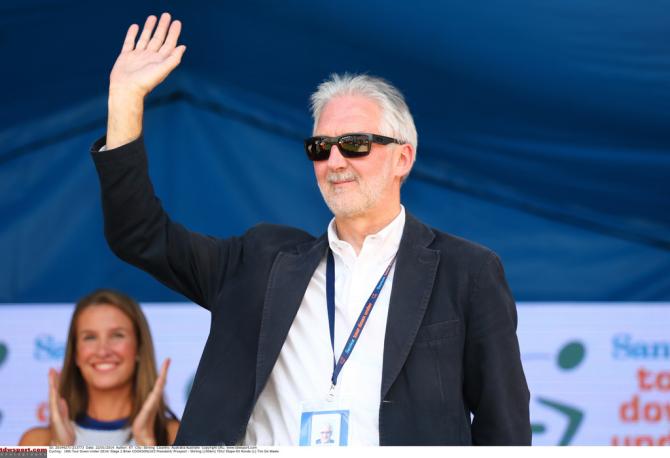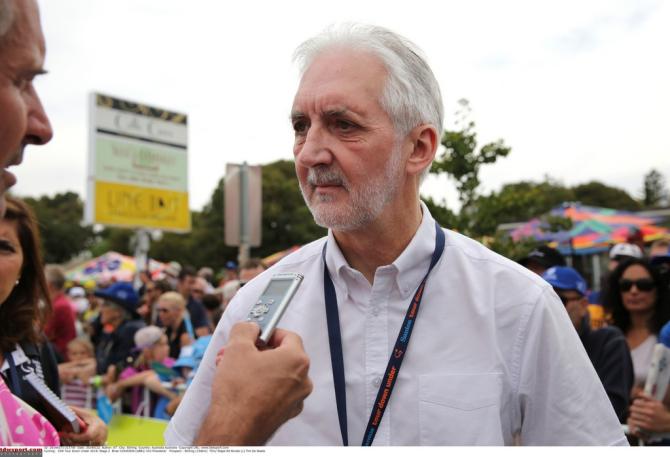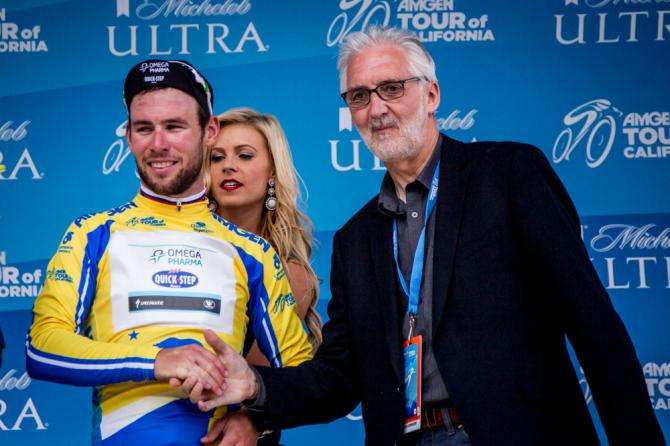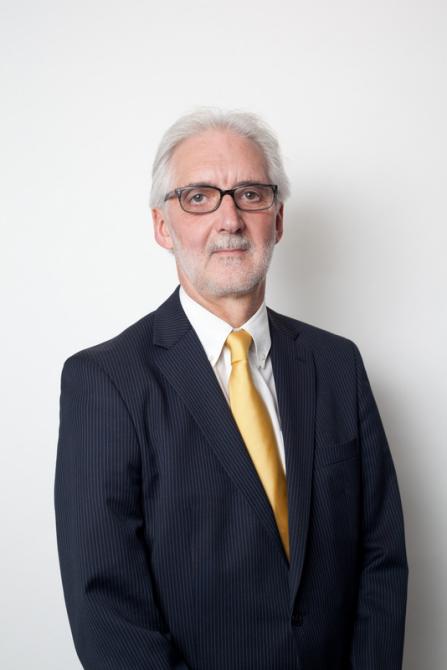Cookson on his son's role at Team Sky, Zorzoli and Froome's TUE
UCI President hopes cycling can build on Tour de France success




UCI president Brian Cookson has told Cyclingnews that he is convinced that the success of the Tour de France Grand Depart in Yorkshire can help professional cycling finally shake off its problems of the past and grow economically if everyone works together to implement the changes that will stop the sport becoming a dinosaur.
Cookson is in Leeds for the Grand Depart of the Tour de France and will ride the Etape du Tour with thousands of other riders, covering the route of a Pyrenean stage of the race between Pau and Hautacam on July 20.
Cookson beat Pat McQuaid to become UCI president last September and admitted that his feet have hardly touched the ground as he got up to speed in his new international role.
"It's been exciting, it's been tiring but I love it and think we're making real progress,” he told Cyclingnews in an exclusive interview.
"Sometimes it’s frustrating but it’s also encouraging when you see hundreds of people in Leeds to see a glimpses of riding going past, or at the arena for the team presentation. I often think: ‘What a fantastic sport we've got'. I'm convinced that if we get everything right, we can go on to make it even bigger and even better."
Cookson has always insisted that the time of 'emperor' management, of a president dominating the way the sport is run, is over. He is in favor of diplomacy, discussions and even some transparency for how the UCI governs the sport, for how it handles its anti-doping and even Therapeutic Use Exemptions for medicines.
He insisted the new structures and ways of working in the UCI mean there is no conflict of interest with his son Ollie working for Team Sky. He is also ready to work with the big pro teams in the Project Avignon association, to make the sport's financial cake bigger than ever. He seems to want to keep everyone happy.
Get The Leadout Newsletter
The latest race content, interviews, features, reviews and expert buying guides, direct to your inbox!
The 2014 Tour de France starts in Yorkshire, just over the Pennine hills from his home in rival county Lancashire, but he praised the way Yorkshire has welcomed the race.
"It's absolutely amazing. I'm in awe of the job they've done here in Yorkshire," he admitted.
"They've worked incredibly hard and the Yorkshire people have opened their arms to the Tour de France. It's very rewarding to see. We're going to have a great couple of days in the north. I think it's going to be good as London was. It's not a prologue start but if I remember the stage to Canterbury, I think it's going to be like that again. It's going to be fantastic."
"I've been a bike rider all my life and I've never seen as many people ride bikes as I do today. I think this really is an era where the bike is regaining a lot of strength right round the world."
Pride in how the UCI fights doping
Cookson can rightly be proud of the success story that is British Cycling. He was president of British Cycling for much of that time, building on and alongside the success of British riders and then Team Sky. The success of British Cycling arguably launched his successful run to become the president of the UCI.
He is convinced that the same growth and success for cycling can be replicated and rediscovered in different countries, including Germany, which while being a cycling nation, has largely turned its back on professional racing.
"A lot of people are working hard behind the scenes to do some good work in Germany, that includes the Federation and some race promoters, people are working to put teams together too. I had a meeting in Germany yesterday. I can’t reveal any details but the picture is beginning to turn because of the problems of that era. Germany is the biggest economy in Europe and if we're not in Germany as a sport, we're going to suffer. I think we can get back in and the signs are there. As long as we keep our act together and don’t descend into the problems of the past, I'm optimistic that cycling can be strong again there and in other countries.”
Cookson clearly means doping when he talks about 'the problems of the past’.
"I think the current situation shows that people asked questions and that's right," he conceded, somewhat acknowledging the role played by the cycling media exposing doping, compared to the 'head in the sand' attitude of many media in other sports.
"Equally there will always be people who try and cheat in life and they will probably never disappear. What we showed is that we will not sweep them under the carpet and will deal with them properly. Sometimes they take a long period of time but people should understand we will deal with things properly."
"We've changed our internal process so that the Cycling Anti-Doping is now completely independent so that me nor anybody can say 'test them or don’t test them.' We still have responsibility as an international Federation for anti-doping but as long as I'm the president of the UCI, I'll run our process with integrity."
The UCI has come under fire in recent week concerning a Therapeutic Use Exemption given to Tour de France winner Chris Froome and the delays in Roman Kreuziger's UCI Biological Passport case. Cookson refused to go into specific details of Kreuziger's on-going case but confirmed that more will be done to improve the governance of TUEs, starting with better rules on how TUEs are permitted. He said the general ethics of the sport will come before a single rider's needs to use a specific banned medicine to stay in a race.
"There was a TUE Committee but it was only being used for exceptional cases. This was an entirely routine case and Dr Zorzoli approved it, as WADA confirmed two days later," he said justifying why Zorzoli was able to fast-track Froome's TUE during the Tour de Romandie.
"We've looked at how we canmake that process stronger. We've got a TUE committee and we will now use that Committee more. We'll use it for every TUE case. That may slow the process what's more important? An individual rider or the integrity of an entire sport? Frankly in my view, it's the integrity and reputation of the entire sport."
The UCI has so far refused to provide Cyclingnews with any number of how many TUEs it issues to each team and how many it issues during a specific season. However Cookson backed UCI doctor Mario Zorzoli despite his two-decade history in the sport and lack of controls on how he issued TUE to riders and teams.
"There are issues of medical confidentiality but I think it is something to look and so perhaps publish some number at the end of the year if the WADA approves that," Cookson said.
"Mario has been involved in the sharp end of providing expert medical and anti-doping advice to the UCI for a number of years. In that time there have been a number of controversial cases. But I have confidence in his integrity and expertise. I'm aware of wild accusations made on the internet and elsewhere. And if anyone has some evidence of something that is incorrect, then give it the CIRC, the independent Cycling Reform Commission, give it WADA, give it UK Anti-Doping, give it to the AFLD in France, Don’t make bizarre accusations. Let's see put up or shut up."
No conflict of interest
Brian Cookson's son Ollie works for Team Sky raising a possible conflict of interest with his father's powerful role as UCI president but he dismissed that idea, pointing to the checks and controls in place within the UCI.
"People think I'm sitting in my office like a Svengali controlling all of these things. Of course, that's not true," he said, with an air of despair.
"Every process that the UCI has, licences or whatever, is conducted through a proper process and independent scrutiny. There are commissions and audits. What we done is establish a process that does not include the UCI president or anyone on the UCI Management Committee with anything involved in anti-doping."
"It wouldn’t matter if my son was a rider with Team Sky, Movistar or any other team. I don’t get involved and will never get involved in who is tested, or in disciplinary action. If I went down that road it would be a disaster for us. I can guarantee 100% that I wouldn't get involved in that way, so it doesn't matter on the nationality of a team or a rider. We treat them all the same."
A diplomatic approach
Cookson has been trying to direct and manage the changes planned in professional cycling to fight off the risk of teams forming a breakaway structure or franchise. Pat McQuaid and his predecessor Hein Verbruggen tried to bully the teams and race organisers into submission, Cookson prefers careful diplomacy and negotiations.
"We’re open to and we're engaged in lot of discussion with a number of stakeholders to make pro road racing more sustainable for everyone involved. Part of that is the reform and reviews we started a while back and there's been some good work done there," he said, stating his case.
"Clearly what was missing from that is the improvement in the economic scenario. Lets not just argue about who gets what slice of the cake, let’s think how we make the cake bigger and I welcome Project Avignon and others who contribute to that. I don’t see anyone who thinks a breakaway league is the answer."
"I think the strength of cycling is around its heritage. It's very place and event specific. It's not like Formula 1; you can't suddenly invent 10 new Gran Prix and put them here, there and everywhere. At the same time we have to acknowledge that the world is changing that there are new opportunities. Finding that balance is a challenging task and requires a lot of talk and discussion. The way forward is to get people around the table and that's what we're doing."
"The mistakes in the past were about banging on the table and saying "You've got to do this!" Frankly if you look at emperor lead models, I think they've had their day. I think people require a certain level of involvement and transparency. That's the process we're engaged in." Cookson genuinely seems to want every one to be involved in that change, even if the UCI does little to listen to the requests of arguably its most important stakeholders: the millions of cycling fans around the world.
"The important thing is that people have to understand that we have to evolve. If we don’t evolve, you end up like a dinosaur and you become extinct. We are in a changing environment and we have to do things that reflect that," Cookson argued.
"At the same time we have to strengthen the economy of the sport, so that does involve going to new territories and strengthening our position in old territories like Germany. It involves new technology and new ways of getting benefit in the pro side of the sport."
"Cycling's strength is that it's free; it comes to you. It's free to watch from the road side and quite often it’s free to watch on television. That's also is weakness; there's no gate money and not much TV revenue. The Tour de France is profitable but I struggle to think of other events that are."
"We've got to re-pitch all what acknowledges the heritage, exploits new opportunities and gives us a sustainable future for everyone involved. I think we can all agree we need a stronger financial basis for our sport after losing too many teams and too many events. In all of that there are things and people that are going to have to change and do things differently."
"I think everybody is very protective of their own bit. The way out of that is to get everyone around the table and talk. I'm not going to bang the table and say a race has to shrink and make the change on the calendar. That's a longer process. The key objective is to make the sport stronger for everyone."

Stephen is one of the most experienced member of the Cyclingnews team, having reported on professional cycling since 1994. He has been Head of News at Cyclingnews since 2022, before which he held the position of European editor since 2012 and previously worked for Reuters, Shift Active Media, and CyclingWeekly, among other publications.